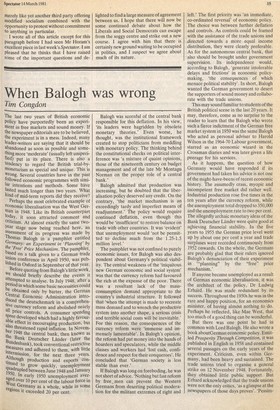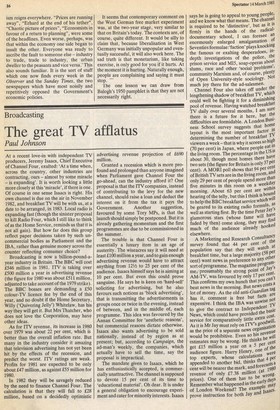When Balogh was wrong
Tun Congdon
The last two years of British economic Policy have purportedly been an experiment in free markets and sound money. If the newspaper editorials are to be believed, the experiment is in a mess. Indeed, many leader-writers are saying that it should be abandoned as soon as possible and something more 'moderate' (usually left unspecified) put in its place. There is also a tendency to regard the British trial-bymonetarism as special and unique. This is wrong. Several countries have in the past followed economic programmes with similar intentions and methods. Some have lasted much longer than two years. What kind of mid-term reports did they receive? Perhaps the most celebrated example of economic liberalisation was the West German in 1948. Like its British counterpart luclaY, it soon attracted comment and criticism. At almost exactly the same twoyear stage now being reached here, an assessment of its progress was made by Thomas Balogh in a pamphlet entitled Germany: an Experiment in 'Planning' by the 'Free' Price Mechanism. The pamphlet, based on a talk given to a German trade Union conference in April 1950, was published in Oxford in September of that year. Before quoting from Balogh's little work, we should briefly describe the events it attempted to analyse. In July 1948, after a period in which some basic necessities could be obtained only by barter, the German Central Economic Administration introduced the deutschemark in a comprehensive currency reform and abolished nearly all price controls. A consumer spending Spree developed which had a highly favour. able effect in encouraging production, but also threatened rapid inflation. In November 1948 the central bank, then known as the Bank Deutscher Lander (later the undesbank), took conventional restrictive M. easures and adhered to them, with little Intermission, for the next three years. Although production and exports continued to grow quickly, unemployment quadrupled between June 1948 and January 1950. In early 1950 unemployment averaged over 10 per cent of the labour force in West Germany as a whole, while in some regions it exceeded 20 per cent. Balogh was scornful of the central bank responsible for this deflation. In his view, 'its leaders were hagridden by obsolete monetary theories.' Even worse, he thought, was the institutional framework created to stop politicians from meddling with monetary policy. The thinking behind the constitutional checks on political interference was 'a mixture of quaint opinions, those of the nineteenth century on budget management and of the late Mr Montagu Norman on the proper role of a central bank.'
Balogh admitted that production was increasing, but he doubted that the liberalisation policy deserved any credit. On the contrary, 'the market mechanism is an exceedingly tardy and imperfect means of readjustment.' The policy would require continued deflation, even though this would be 'insufficient' to restore balance on trade with other countries. It was 'evident' that unemployment would 'not be permitted to decline much from the 1.25-1.5 million level.'
The pamphlet was not confined to purely economic issues, for Balogh was also despondent about Germany's political viability. The central weakness of the 'iniquitous new German economic and social system' was that the currency reform had favoured the rich at the expense of the poor. There was a resultant lack of the massconsumption demand appropriate to the country's industrial structure. It followed that 'when the attempt is made to recreate mass demand and to wrench the productive system into another shape, a serious crisis and terrible social costs will be inevitable.' For this reason, the consequences of the currency reform were 'immense and immensely lamentable'. In Balogh's opinion, the reform had put money into the hands of hoarders and speculators, while the middle classes and workers had 'lost cash, confidence and respect for their conquerors'. He concluded that 'German society is less stable than ever.'
If Balogh was long on foreboding, he was not short of advice. 'Nothing but fast reform by free men can prevent the Western Germans from deserting political moderation for the militant extremes of right and left.' The first priority was 'an immediate, co-ordinated reversal' of economic policy. The choice was between further deflation and controls. As controls could be framed with the assistance of the trade unions and directed towards a more equal income distribution, they were clearly preferable. As for the autonomous central bank, that I also should be brought under government supervision. Its independence would, according to Balogh, 'generate intolerable delays and frictions' in economic policymaking, 'the consequences of which menace political stability'. In short, Balogh wanted the German government to desert the supporters of sound money and collaborate with the trade unions.
This may sound familiar to students of the British political scene in the last 20 years. It may, therefore, come as no surprise to the reader to learn that the Balogh who wrote such a fierce indictment of the German free market system in 1950 was the same Balogh who acted as personal adviser to Harold Wilson in the 1964-70 Labour government, starred as an economic wizard in the Crogsman diaries and was later given a life peerage for his services.
As it happens, the question of how Germany would have responded if its government had taken his advice is not one of the might-have-beens of recent economic history. The assumedly crass, myopic and incompetent free market did rather well. Industrial production rose five times in the ten years after the currency reform, while the unemployment total dropped to 350,000 and the unemployment rate to two per cent. The allegedly archaic monetary ideas of the Bank Deutscher Lander were quite good at achieving financial stability. In the five years to 1955 the German price level went up by about one per cent a year and trade surpluses were recorded continuously from 1952 onwards. On the whole, the Germans are probably glad that their rulers ignored Balogh's denunciation of their experiment in "planning" by the "free" price mechanism.'
If anyone became unemployed as a result of German economic liberalisation, it was the architect of the policy, Dr Ludwig Erhard. He was made redundant by its success. Throughout the 1950s he was in the rare and happy position, for an economics minister, of having almost nothing to do. Perhaps he reflected, like Mae West, that too much of a good thing can be wonderful.
But there was one point he had in common with Lord Balogh. He also wrote a book aboutGerman economic policy. Entitled Prosperity Through Competition, it was published in English in 1958 and contained several passages on the early years of the experiment. Criticism, even within Germany, had been heavy and sustained. The trade unions tried to organise a general strike on 12 November 1948. Fortunately, they obtained little public support. But Erhard acknowledged that the trade unions were not the only critics, 'ag a glimpse at the newspapers of those days proves'. 'Pessim ism reigns everywhere. "Prices are running away", "Erhard at the end of his tether", "Chaotic picture of prices", "Economists in favour of a return to planning", were some of the headlines. Even worse, perhaps, was that within the economy one side began to insult the other. Everyone was ready to ascribe the fault to someone else – industry to trade, trade to industry, the urban dweller to the peasants and vice versa.' This also sounds familiar. It is the sort of stuff which one now finds every week in the Observer and the Sunday Times, the two newspapers which have most noisily and repetitively opposed the Government's economic policies. It seems that contemporary comment on the West German free market experiment was, at the two-year stage, very similar to that on Britain's today. The contexts are, of course, quite different. It would be silly to claim that, because liberalisation in West Germany was initially unpopular and eventually successful, it will also work here. The sad truth is that monetarism, like taking exercise, is only good for you if it hurts. At the moment it is hurting. Naturally enough, people are complaining and saying it must stop. — The one lesson we can draw from Balogh's 1950 pamphlet is that they are not necessarily right.







































 Previous page
Previous page